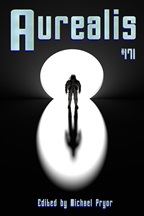“Dregs of Destiny” by Ciaran Hannigan
“The Guest” by Ashley Cracknell
“Seven Unread Subspace Messages” by Christopher Henckel
Reviewed by C. D. Lewis
Aurealis offers science fiction and fantasy every month (except December & January) in a full-sized print format. The June 2024 issue offers three new works.
Ciaran Hannigan‘s 7,900-word “Dregs of Destiny” is a first-person account from an exhausted archery unit approaching the culminating battle of humanity’s years-long campaign against monstrous forces of darkness. Details work against a glorious depiction of impending victory: the seasick look of a dragon-mounted hero, the cheap-looking outfits of the old men who might be sorcerers, and so on. Fantasy, with a lot of road dust. “Dregs of Destiny” successfully builds anticipation for the final battle’s outcome; overt doubt about the prophecy on which victory depends and the apparent normalcy of the prophetic hero underpin real concern that believers will be disappointed, and the world lost to monsters. The piece celebrates the fortitude of a working class with no special advantages and digs against high-ranked persons who seem to have been gifted their advantages.
Ashley Cracknell‘s 2500-word first-person horror story “The Guest” relates the tale of why the narrator’s flat has no chairs. In the tradition of just-desserts fairy tales about obedience to parents, ignored house rules lead to supernatural horrors. (You had one job….) Readers who like creepy supernatural ambiance will love what “The Guest” brings to the table.
Set in a colossal space-hospital for organic starships, Christopher Henckel‘s 5,900-word “Seven Unread Subspace Messages” opens with upbeat narration by an organic starship obstetric drone operator, but soon descends into anxiety-infused scenes that shake with under-processed grief over old but heartbreaking loss. “Seven Unread Subspace Messages” reveals in a slow drip why the narrator’s emotional state is a wreck and how out of control he has become. The narrator’s life and relationships are a disaster, and so too the outlook for his patient. Is he going to get himself fired? Will he save his patient and himself, or succumb to the darkness? The piece presents a sympathetic view on anxiety and grief, and provides an optimistic conclusion.
 Aurealis
Aurealis